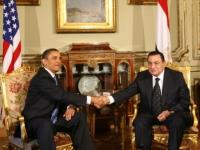BROOKE GLADSTONE: From WNYC in New York, this is NPR's On the Media. Bob Garfield is away. I'm Brooke Gladstone. And by the end of this week, it became known simply as "the speech."
MALE CORRESPONDENT: A speech like perhaps no other. Hello, again, everybody —
MALE CORRESPONDENT: The whole world is going to be talking about this speech most of the day today, and we're going to continuing talking about it too —
[OVERTALK]
MALE CORRESPONDENT: Now people are looking for something more concrete. How he does that, I don't know. I think this is sort of the Mt. Everest [LAUGHS] of speeches.
BROOKE GLADSTONE: Wow. It was an important speech and expectations were high, even as the White House worked to tamp them. Watching the speech itself, you got the sense that every word had a cost/benefit analysis behind it. For example, by saying this
PRESIDENT BARACK OBAMA: Unlike Afghanistan, Iraq was a war of choice that provoked strong differences in my country and around the world.
BROOKE GLADSTONE: Obama prompted this from FOX and friends.
MALE CORRESPONDENT: And the constant apologizing about America to aggrandize his own sort of cult of personality around the world I don't think is helpful.
BROOKE GLADSTONE: But, obviously, it drew a very different response from his audience in the region. For every topic he touched, the Iraq War, the Israeli settlements, nuclear weapons, some were thrilled, others angered. And for still others, the speech was notable for words not said. No mention of the human rights records of the Saudi Arabian or Egyptian regimes. Consider the cost/benefit analysis that went into that. And then, there was this:
PRESIDENT BARACK OBAMA: I know there has been controversy about the promotion of democracy in recent years, and much of this controversy is connected to the war in Iraq. So, let me be clear. No system of government can or should be imposed by one nation by any other.
NAILA HAMDY: The state media picked on the fact that democracy is a principle that cannot be inflicted by external forces. That was the official media picking up on that.
BROOKE GLADSTONE: Nail Hamdy is the Chair of the Journalism Department at the American University in Cairo. She says that in Egypt, the authoritarian grip on the media has begun to loosen, that the government seems increasingly willing to tolerate, within undefined and unpredictable limits, multiple news outlets that readily criticize the regime of Egyptian President Hosni Mubarak, who some call a dictator. State media, of course, still tout the official line of the Mubarak regime, which is why they focus specifically on the democracy moment in Obama's speech, the underlying message for them being the Mubarak regime is here to stay. The independent and opposition party papers also focused on that moment, but they had a very different take
NAILA HAMDY: saying, what is going to happen with freedom or freedom of expression or other civil liberties, you know, what's going to happen? Has he abandoned us? You know, so I would say that was one issue that was, at least internally here, was really most cited. I mean, not taking away from, you know, the Arab/Palestinian issue, the Iranian issue, but I think the Arab Middle East conflict, the Iranian conflict appeared to be more important to the governments, while internally everybody's looking more at democracy, more freedom, more development of civil society.
BROOKE GLADSTONE: So break it down according to where the particular news outlets stood politically, how it responded to Obama's speech.
NAILA HAMDY: If you look at the Al Ahram, which is the semi official and most important newspaper associated to the government, the first headline was Mubarak discusses Middle East regional issues with Obama, how Obama says that Mubarak is a man of great experience and is committed to working together to achieve regional ambitions. So you have that. The whole Egyptian media landscape was more positive than anything else. Even the most opposition type of voices took pride in the fact that he decided to speak from Egypt.
BROOKE GLADSTONE: As the sage once said, you know, 90 percent of success in life is just showing up?
NAILA HAMDY: Well, I think that he was right because, you know, if you look at the headline of Mustri Elion , which is an independent newspaper, it actually says Cairo describes Obama's speech to Muslims as fantastic or incredible, whilst the Brotherhood, referring to Egypt’s Muslim Brotherhood, and Tehran described it as words of slogans. I think this is a very indicative headline because they put the Brotherhood in the same basket with Tehran and Iran.
BROOKE GLADSTONE: They took the opportunity of Obama's speech and the different reactions to it to lump the politically potent Muslim Brotherhood in Egypt with the incredibly unpopular regime in Iran.
NAILA HAMDY: And linking them together was very significant.
BROOKE GLADSTONE: The Egyptian government allows opposition newspapers and blogs, but it also jails dissidents and, and opponents. It's kind of like semi free speech, isn't it? It's been described to us as almost pre revolutionary.
NAILA HAMDY: The way I view it is that it is moving from an authoritarian media to a more liberal one but is doing so at a slow pace, so therefore you find more and more alternate voices, more and more independent media. But, every once and again, the government will take sort of crab like steps and they will maybe harass one blogger or arrest one journalist.
BROOKE GLADSTONE: So at the moment, nobody really knows what the rules are.
NAILA HAMDY: No. The rules are, are — have never been 100 percent clear, not at the moment or at any other moment.
BROOKE GLADSTONE: Naila, thank you very much.
NAILA HAMDY: You’re welcome.
BROOKE GLADSTONE: Naila Hamdy is the Chair of the Department of Journalism and Mass Communications at the American University in Cairo.
